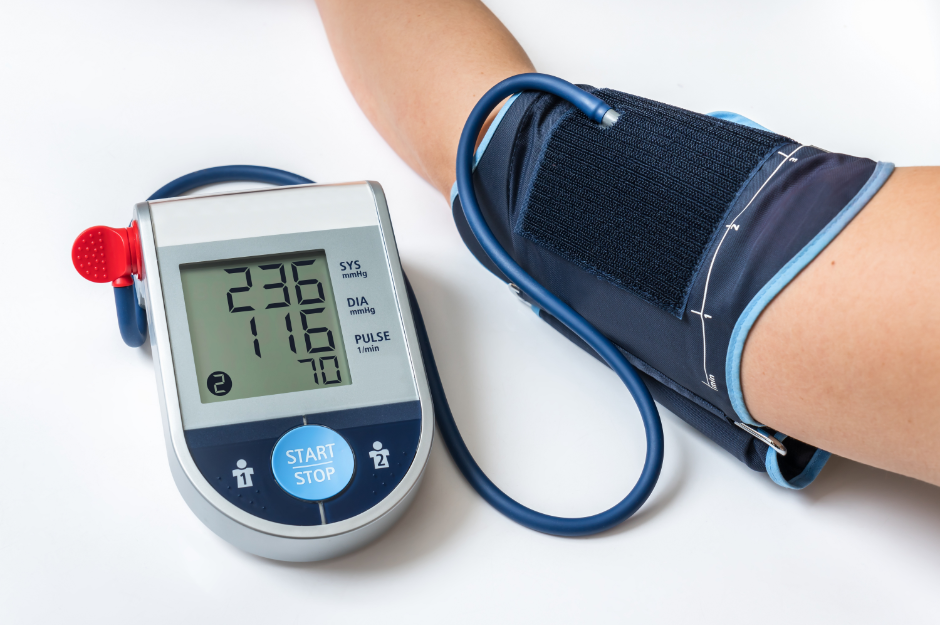Hypertension and the Heart: How High Blood Pressure Damages Your Arteries

High blood pressure, also known as hypertension, is one of the most common lifestyle-related health conditions worldwide. Often called the “silent killer”, it usually develops without obvious symptoms but can quietly damage vital organs – especially the heart and arteries.
In India, millions of people suffer from hypertension, and unfortunately, many remain undiagnosed until a major complication like a heart attack, stroke, or kidney failure occurs. Understanding how hypertension affects the heart and arteries is essential for prevention, early diagnosis, and timely treatment.
In this article, Dr. Vaibhav Mishra, a leading heart specialist, explains how high blood pressure silently damages the cardiovascular system and what you can do to protect your heart.
✅ What Is Hypertension?
Blood pressure is the force exerted by blood against the walls of the arteries as the heart pumps it through the body.
- Normal blood pressure: Less than 120/80 mmHg
- Elevated blood pressure: 120–129 / <80 mmHg
- Stage 1 hypertension: 130–139 / 80–89 mmHg
- Stage 2 hypertension: 140/90 mmHg or higher
Hypertension occurs when the pressure in your arteries remains consistently high, forcing your heart to work harder to pump blood.
✅ How High Blood Pressure Damages Your Arteries
- Artery Wall Stress
Constant high pressure causes micro-tears in the inner lining of arteries. The body tries to repair these tears by depositing cholesterol and fat, leading to plaque buildup.
- Atherosclerosis (Hardening of Arteries)
Over time, these plaques narrow the arteries, reducing blood flow. This process, called atherosclerosis, is the foundation of most heart diseases.
- Increased Risk of Blood Clots
Damaged arteries are more prone to clot formation. A clot can block blood supply to the heart (causing a heart attack) or brain (causing a stroke).
- Weakened Artery Walls
High pressure can weaken arterial walls, leading to aneurysms (bulging of blood vessels) which may rupture, causing life-threatening bleeding.
✅ Effects of Hypertension on the Heart
- Coronary Artery Disease (CAD)
- Blocked or narrowed arteries reduce oxygen supply to the heart.
- Leads to chest pain (angina) and increases the risk of heart attack.
- Left Ventricular Hypertrophy (LVH)
- The heart’s left ventricle thickens due to overwork.
- This weakens heart function and can cause heart failure.
- Heart Failure
- Long-standing hypertension forces the heart to pump harder.
- Over time, the heart muscle weakens, leading to fluid retention, fatigue, and breathlessness.
- Arrhythmias (Irregular Heartbeats)
- Hypertension increases the risk of atrial fibrillation, a dangerous irregular heartbeat that can cause stroke.
- Sudden Cardiac Death
- Severe uncontrolled hypertension can lead to fatal heart rhythm disturbances.
✅ Other Organs Affected by Hypertension
- Brain: Stroke, dementia
- Kidneys: Chronic kidney disease
- Eyes: Hypertensive retinopathy, vision loss
- Peripheral arteries: Leg pain due to poor circulation
✅ Risk Factors That Make Hypertension More Dangerous
- Family history of hypertension or heart disease
- Sedentary lifestyle
- High-salt and high-fat diet
- Obesity
- Smoking and alcohol consumption
- Diabetes and high cholesterol
- Stress and poor sleep patterns
✅ How to Protect Your Heart from Hypertension
- Lifestyle Changes
- Reduce salt intake to less than 5 grams per day.
- Eat a heart-healthy diet (fruits, vegetables, whole grains, lean proteins).
- Exercise regularly (30 minutes, 5 days a week).
- Maintain a healthy weight and waistline.
- Limit alcohol, quit smoking.
- Practice stress management (yoga, meditation, deep breathing).
- Regular Health Checkups
- Monitor your blood pressure regularly.
- Annual heart checkups are essential after the age of 40.
- Get cholesterol, blood sugar, and kidney function tests checked.
- Medications
If lifestyle modifications aren’t enough, doctors prescribe antihypertensive medications to control blood pressure. Always take them as directed without skipping doses.
✅ Why Early Diagnosis Matters
Many patients discover hypertension only when they suffer a heart attack, stroke, or kidney failure. Regular screening can detect high blood pressure early, allowing for lifestyle correction and treatment to prevent complications.
✅ Dr. Vaibhav Mishra – Expert in Managing Hypertension and Heart Disease
If you are looking for an experienced cardiologist for hypertension management and heart disease treatment, Dr. Vaibhav Mishra is among the most trusted names.
- Specializes in minimally invasive cardiac surgery (MICS) and advanced heart procedures.
- Expert in treating coronary artery disease, hypertension-related complications, and heart failure.
- Focuses on preventive cardiology, helping patients manage blood pressure before it leads to serious complications.
- Trusted by patients across Delhi NCR for his personalized and compassionate care.
With the right diagnosis, treatment, and lifestyle support, Dr. Mishra ensures patients live longer and healthier lives.
✅ Final Thoughts
Hypertension is not just about high numbers on a blood pressure machine. It is a silent but serious condition that can damage your arteries, strain your heart, and shorten your lifespan if ignored. The good news is that with early diagnosis, healthy lifestyle changes, and timely medical care, hypertension can be controlled, and complications can be prevented.
If you have a family history of high blood pressure or experience symptoms like frequent headaches, chest discomfort, or shortness of breath, consult a heart specialist immediately.
Your heart health is in your hands. Don’t wait for a crisis – get regular checkups and take control of your blood pressure today.
